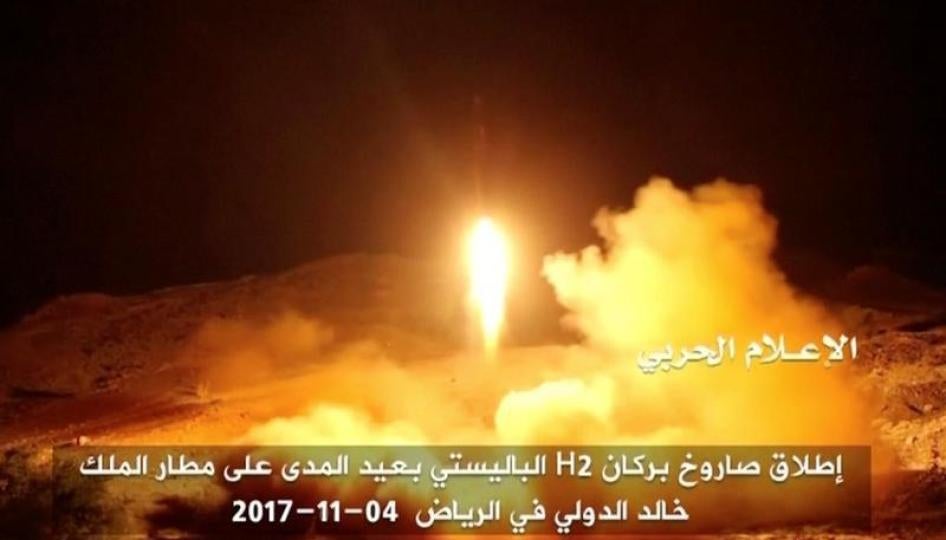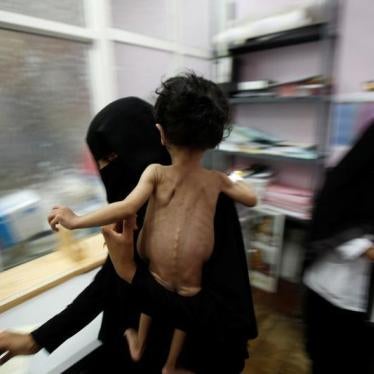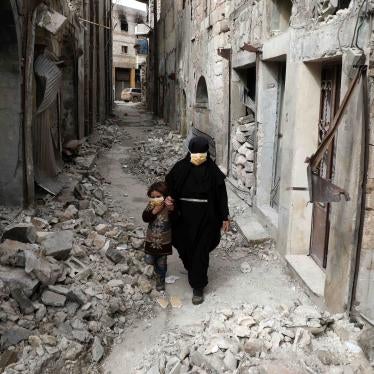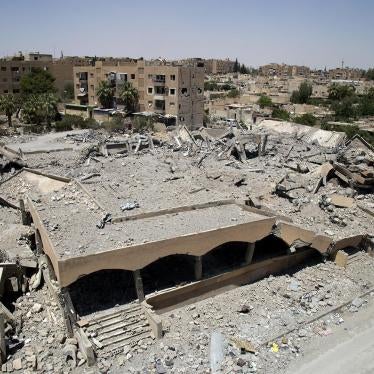(Beirut) – The ballistic missile strike by Houthi-Saleh forces in Yemen on Riyadh’s main international airport on November 4, 2017, is most likely a war crime, Human Rights Watch said today. Saudi Arabia responded to the attack by claiming Iran, which it accuses of aiding the Houthi rebels who control much of northern Yemen, smuggled the missile to Yemen and announcing a “temporary” closure of all Yemeni land, sea, and air ports. Saudi claims about the missile’s origin could not be verified and, according to media reports, Iranian officials denied the allegation.
Houthi-Saleh-aligned media reported that the armed group fired a Burkan H2 ballistic missile at King Khalid International Airport, northeast of the Saudi capital, Riyadh. Saudi media reported that its missile defenses intercepted the missile in flight, but that some missile fragments fell inside the airport area. No casualties were reported. On November 6, the Saudi government said it was “temporarily” closing all Yemeni ports in response to the attack, but that humanitarian aid could continue to enter Yemen under strict coalition vetting procedures. Further restrictions on aid to Yemen would likely violate international law on humanitarian access, Human Rights Watch said.
“The Houthis’ launching of an indiscriminate ballistic missile at a predominantly civilian airport is an apparent war crime,” said Sarah Leah Whitson, Middle East director at Human Rights Watch. “But this unlawful attack is no justification for Saudi Arabia to exacerbate Yemen’s humanitarian catastrophe by further restricting aid and access to the country.”
Col. Turki al-Maliki, the spokesman for the Saudi-led coalition, told the governmental Saudi Press Agency on November 4 that Houthi-Saleh forces fired the missile at 8:07 p.m. from Yemen toward Riyadh, but that the Saudi Patriot air and missile defense system intercepted the missile on the eastern side of the airport.
King Khalid International Airport is about 35 kilometers northeast of the densely populated areas of Riyadh. The airport compound includes a company that services and maintains military aircraft. While the site where Houthi-Saleh forces launched the missile is unclear, the airport is approximately 850 kilometers from the Yemeni border. An attack with an unguided ballistic missile such as the Burkan H2 from this range is indiscriminate since these weapons are not capable of the necessary accuracy to target military objectives. When deliberately or indiscriminately directed toward populated areas or civilian objects, such attacks violate the laws of war, and may amount to war crimes.
The attack on Riyadh’s international airport is the latest in a series of indiscriminate Houthi-Saleh ballistic missile attacks on Saudi Arabia, though it was the first to reach the capital. In October 2016, Saudi Arabia accused Houthi-Saleh forces of targeting the holy city of Mecca with a missile, which they claimed Saudi defenses intercepted 65 kilometers south of the city. Houthi forces admitted they had launched a ballistic missile into Saudi Arabia, which they described as a Burkan 1, but claimed the target was Jeddah’s King Abdulaziz International Airport. In another attack, on July 22, 2017, Houthi-Saleh forces struck an oil refinery near the port city Yanbu, 300 kilometers northwest of Jeddah, with a Burkan H2 ballistic missile.
Human Rights Watch has documented the Houthi-Saleh forces’ indiscriminate launching of short-range unguided artillery rockets from northern Yemen into populated areas of southern Saudi Arabia since May 2015. Some of these attacks killed civilians.
After the attack, on November 5, Saudi authorities published a wanted list of 40 Houthi officials, offering financial rewards of between US$5 million and US$30 million for anyone who provides information leading to their arrests. The next day the coalition announced it would close all sea, land, and air ports to Yemen temporarily, while declaring that humanitarian aid would continue to be allowed in after strict vetting procedures. While warring parties may impose blockades during an armed conflict, a blockade is unlawful if it has the sole purpose of starving the civilian population or denying the population goods indispensable for its survival. A blockade also violates the laws of war if it has a disproportionate impact on the civilian population, when the harm to civilians is, or may be expected to be, greater than the concrete and direct military advantage anticipated from the blockade.
The Saudi-led coalition’s restrictions on imports existing before the recent announcement have already worsened the dire humanitarian situation of Yemeni civilians. Yemen is experiencing the world’s largest humanitarian crisis, with more than seven million people on the brink of famine and hundreds of thousands suffering from cholera.
Previous coalition claims that they would abide by international law when imposing a blockade have proven false, Human Rights Watch said. The coalition has delayed and diverted fuel tankers, closed a critical port, and stopped life-saving goods from reaching the population. The coalition has also closed the country’s main airport for more than a year, blocked rights groups from entering Yemen, and repeatedly interfered with United Nations flights carrying humanitarian workers into Yemen. Houthi-Saleh forces, who control the capital, Sanaa, and much of the country, have also violated international legal obligations to facilitate humanitarian aid to civilians and significantly harmed the civilian population.
Since March 2015, the Saudi-led coalition has carried out military operations against Houthi-Saleh forces including scores of unlawful airstrikes that hit homes, markets, hospitals, schools, and mosques. From June to August, Human Rights Watch documented six coalition airstrikes that killed more than 50 civilians in Yemen. On November 5, the UN humanitarian coordinator for Yemen stated that he was “horrified” by the continued violence by all sides to the conflict, singling out a November 1 coalition airstrike on a busy market in Saada governorate that killed 31 people, including six children, as well as recent indiscriminate shelling of Taizz city that killed five children.
The laws of war prohibit deliberate, indiscriminate, and disproportionate attacks on civilians. Attacks that are not directed at a specific military objective or cannot distinguish between civilians and military objectives are considered indiscriminate. An attack is unlawfully disproportionate if the anticipated loss of civilian life and property is greater than the expected military gain from the attack. Warring parties must do everything feasible to verify that targets are military objectives and minimize civilian casualties.
Individuals who commit serious violations of the laws of war with criminal intent – that is, intentionally or recklessly – may be prosecuted for war crimes. Individuals may also be held criminally liable for assisting in, facilitating, aiding, or abetting a war crime.
“The large casualties suffered by Yemeni civilians provides no excuse for Houthi-Saleh forces to commit indiscriminate missile attacks on Saudi cities,” Whitson said. “The laws of war apply to all sides, and all sides need to minimize harm to civilians whatever their nationality.”








